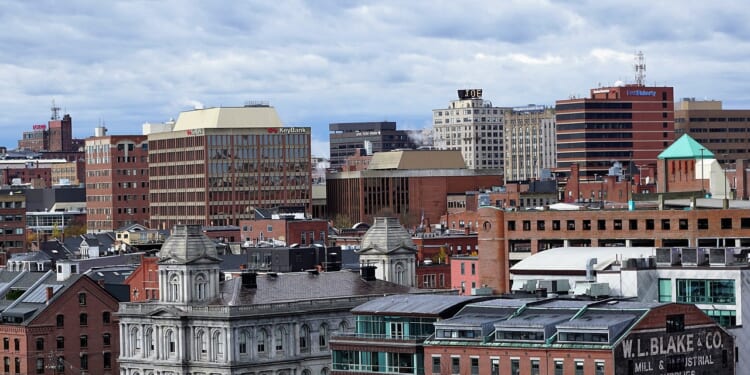Portland’s leaders sold rent control as a lifeline for struggling tenants. But a new independent economic study reveals it’s becoming a noose around the neck of the city’s homeowners, who are already shouldering rising costs across the board.
The Greater Portland Board of Realtors recently released an independent study conducted by Wallace Economic Advisers that shows how Portland’s rent control ordinance has quietly shifted millions of dollars in property tax burdens onto single-family homeowners and condo owners. It validates what Maine Policy Institute (MPI) warned earlier this year: policies that distort housing markets under the guise of equity often backfire, and rent control is no exception.
How Rent Control Raises Property Taxes on Everyone Else
The Wallace report, available on the Greater Portland Board of Realtors website, breaks down the basic economic consequences of rent control in Portland.
Here are the key takeaways:
- Tax Base Shrinkage: The city’s taxable property valuation base has shrunk by an estimated 3.2% to 5.4% due to rent restrictions.
- Burden Shift: As a result, $6.3 million to $10.6 million per year in lost tax revenue is now being picked up by others, primarily single-family homeowners and condominium owners, who shoulder 63% of that added burden.
- Impact on Families: For the median Portland home, currently valued around $605,000, this policy translates to $224–$379 more in taxes per year starting in FY2026, and up to $2,100 more over five years.
- Market Distortion: The housing market is already reflecting these inefficiencies. Since 2022, 3–4 unit buildings (covered mainly by rent control) have stagnated or declined in value, while non-controlled units, such as single-family homes and duplexes, have continued to appreciate.
The Spin Doesn’t Hold Up
The Portland Tenants Union has tried to frame the report as evidence of success, highlighting that tenants in controlled units are saving between $6,000 and $10,600 per year. However, this argument overlooks the real costs the policy imposes on others, not just those in the report but also those affecting renters outside the city’s rent control system.
Rent control may benefit a few renters lucky enough to lock in low rates, but studies show it:
- Pushes up rents elsewhere in the city by reducing supply in the broader market.
- Disincentivizes investment and maintenance, resulting in a decline in the quality of available housing over time.
- Reduces the city’s tax base, meaning services either get cut or property taxes increase, as the recent report shows.
- Contributes to housing scarcity, leaving countless renters without access to any housing, whether affordable or not.
Importantly, the Realtors’ study doesn’t even model the long-term market effects, like reduced housing construction or deteriorating building quality. That means the findings actually understate the long-run harm.
MPI Warned About This
In our 2025 report, “Under Construction: Fixing Maine’s Self-Imposed Housing Crisis“, Maine Policy Institute detailed how local housing regulations, including rent control, artificially restrict supply, drive up costs, and lead to worse outcomes for buyers and renters alike.
Among the key findings:
- Rent control, inclusionary zoning, and restrictions on short-term rentals hinder housing development.
- Zoned towns in Maine had 7% higher home prices in 2023 than unzoned ones, a gap that’s growing.
- A 10,000-square-foot increase in minimum lot size correlates with a 4% increase in home prices.
- Local governments, rather than the state, should take the lead; however, they require state-level incentives, not top-down mandates, to implement reforms.
MPI’s recommendation was clear: repeal rent control and streamline regulations to foster housing supply and reduce pressure on renters and homeowners alike.
This Isn’t Just a Portland Problem
The damaging effects of rent control aren’t new or unique to Portland. As noted in the National Multifamily Housing Council’s literature review, economists overwhelmingly agree that:
- Rent control misallocates housing, keeping people in units that don’t match their needs.
- It reduces the quantity and quality of available housing over time.
- It leads to higher rents in the uncontrolled market, with some studies showing substantial spillover effects.
- The fiscal costs of implementing and managing rent control programs are high and often overlooked.
Even moderate rent stabilization policies come with significant trade-offs that proponents often overlook.
Conclusion: A Policy That Backfires
Portland’s rent control policy is harming the very people it claims to protect and forcing others to bear the burden. Homeowners and condo dwellers are quietly absorbing tax hikes, making the path to homeownership increasingly difficult for Portland’s working class. Renters are facing tighter markets and higher prices unless they get lucky enough to snag a controlled unit. If Portland truly wants to make housing more affordable, it’s time to reverse course.
Maine Policy Institute supports real reform, policies that actually increase the supply of housing and lower costs across the board. That means:
- Repealing rent control and other policies that discourage building more housing.
- Encouraging local governments to streamline permitting, zoning, and land use codes.
- Using state-level incentives, not one-size-fits-all mandates, to promote deregulation.
- Empowering private developers, property owners, and renters to make choices in a freer housing market.
Let’s stop subsidizing inefficiency and start building a Maine that supports economic freedom and affordability of housing across the state.










